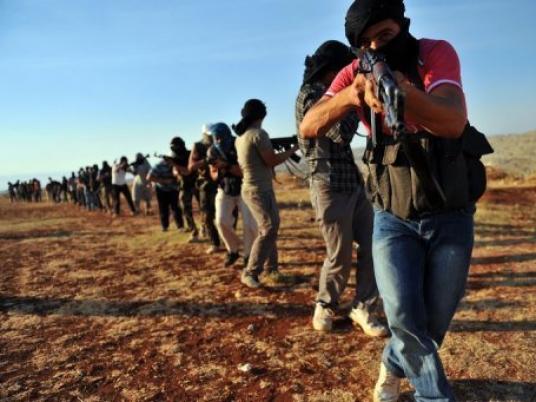
A fighter returns to a Free Syrian Army safe house after a shift on the Aleppo frontline, cranks up the volume of the television, lights a cigarette and looks at himself in a broken mirror.
"Anyone got hair gel? I look a mess."
Meet Abu Zeid al-Tunsi, a Tunisian elite sniper and the group's official jihadi troubadour.
Syria's rebellion has attracted fighters from dozens of countries but their motivations do not always fit the Al-Qaeda mold, making for a colourful and multilingual crew with some very personal interpretations of jihad, or holy war.
Abu Zeid, who also fought alongside Libya's rebels last year to help bring an end to Moamer Kadhafi's 42-year rule, describes himself as a "freelance" jihadi fighter who does not belong to any group.
President "Bashar al-Assad and his people are Shiite and it is my duty to help in restoring true Islam, Sunni Islam," he explains, gulping down a bottle of ice-cold mandarin crush.
"I leave my country when I have to, to wage jihad, then I go home. It's my personal decision, I don't need a flag for my struggle and I just hook up with whoever needs my expertise," Abu Zeid says.
His loose observance of the dawn-to-dusk fast during the Muslim holy month of Ramadan would likely bar him from joining some of the more radical Islamist groups sheltering many of Syria's foreign jihadi corps.
The Free Syrian Army is an alliance of loosely-connected brigades operating under the theoretical leadership of a Turkey-based group of defecting army officers who have generally condemned the emergence of jihadi groups.
But many Syrian FSA rank-and-file argue they need all the help they can get.
"Groups such as Ahrar al-Sham, Liwa al-Tawhid, Fajr al-Islam, Jabat al-Nusra have experienced fighters who are like the revolution's elite commando troops," says Abu Haidar, a Syrian FSA coordinator in Aleppo's Saif al-Dawla district.
"The rest of the world isn't helping us, they are," says the chain-smoking fighter during a lull in the shelling. "They are not all Al-Qaeda, many are just volunteers who want Syria to be freed."
Abu Zeid is best known in the group as the nasheed (Islamic songs) singer.
"When I'm back home, I go on the Internet and find the latest nasheed. I write the lyrics down on a piece of paper and learn the melodies," he says.
A wounded fighter is rushed in to a makeshift clinic in Saif al-Dawla. Once the rebel is successfully treated and bandaged, Abu Zeid breaks into song and many of the young Syrians from the neighborhood join in joyfully.
He finishes his song, picks up his black and grey sniper rifle and, a broad smile on his face, skips out the door to return to the frontline, giving a quick bow like an artist between rounds of applause.
"Those little singing sessions are good for our morale," says Abu Khaled, a young volunteer at the clinic.
Moments later, a young rebel fighter with a slight injury to his hand walks in. Nobody has ever seen him.
"Does anyone speak Turkish?"
He is from Azerbaijan, speaks no Arabic and lost his way after being separated from the rest of his unit during clashes.
"I saw some footage on television of the war and decided to come here to help the Syrians fight Bashar," he says. "It's the first time I do this."
Later that day, a fighter from Turkey rolled up demanding treatment for a minor wound and the pair eventually spend the night chatting and resting in the clinic before leaving together the next morning.
Some foreign fighters' reasons for being on the Syrian frontline are even more obscure.
Abu Mohamed, is a Dutch-Iraqi fighter who never talks to anyone and regularly returns from the front to sleep under the clinic's air conditioner or read the Koran.
He left his wife and two children in the Netherlands to join the battle a few weeks earlier. He claims he belongs to no particular group but sometimes links up with the foreign-dominated Jabat al-Nusra (Support Front).
"I like to work alone, that's it. But sometimes I get tired so I come here. I don't want to talk about it," he says.
Abu Mohamed, a big bear of a man always dressed in a traditional dishdasha robe, picks up his Kalashnikov and ammunition and walks wearily up the stairs from the basement clinic.
Ahmad, a young FSA supporter from the district whose role model is tennis player Roger Federer and who sometimes stands guard outside the clinic at night, watches Abu Mohamed walk down the street, all by himself, straight into the shelling zone.
"He never wants help but he's helpful to us. We're not quite sure what's going on inside his head but we just let him be," says Ahmad.




